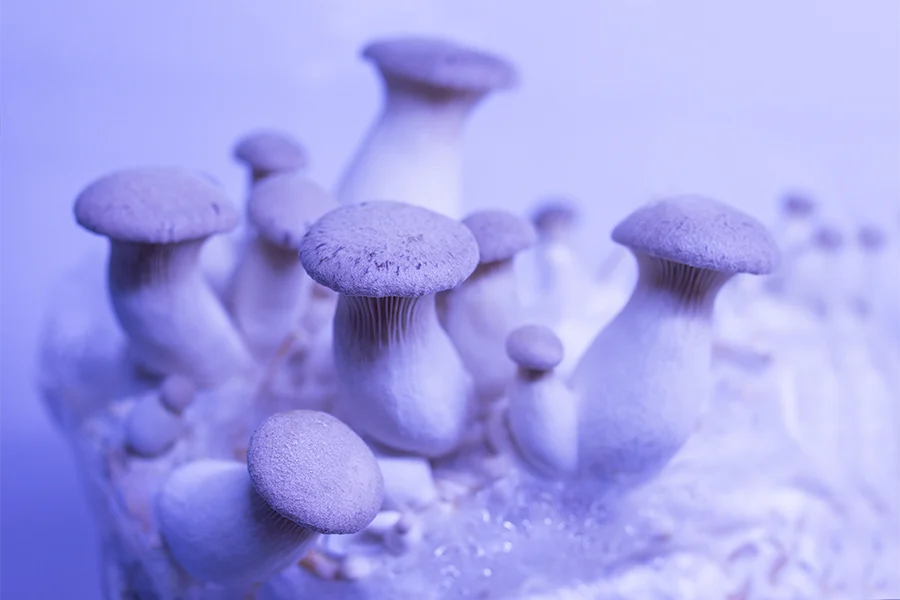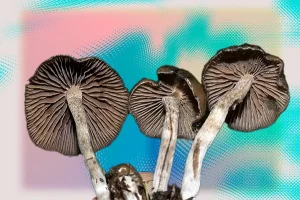The first frost each winter usually spells the end of the mushroom fruiting season, but nifty mycologists are increasingly finding ways to allow fungi to proliferate throughout the year. A report in the Indian newspaper, The Hindu, recently claimed that farmers in the northwest region of Kashmir have remarkably been able to cultivate mushrooms in sub-zero temperatures.
It reported that farmer Nazir Ahmed Dar had success after constructing a “mushroom growing unit” to shelter his produce from snowfall this February. “This is the result of my tireless hard work and useful advice from the Agriculture Department experts,” he told The Hindu.
“Mushrooms can adapt and are able to be produced at sub-zero levels in the Arctic and Antarctica,” says mycologist Darren Le Baron. Several low-tech approaches to growing mushrooms have been pioneered in India in recent years, specifically in West Bengal, he adds, as production has been identified as a method for farmers to significantly increase their income. “I am inspired by what I have seen taking place in India, in general,” Le Baron says. “Communities are pioneering new ways of cultivating mushrooms.”
At colder temperatures, mushrooms tend to grow more slowly, and farmers will seek to increase the temperature within any indoor facility in order to support mycelium growth. Le Baron says he successfully grew oyster mushrooms in Somerset House, London, in cold temperatures through the use of coal-holes in which bespoke mini-greenhouses are dug into the earth and humidified. “It’s not the environment that they generally grow within, but we were able to get amazing results down there.”
READ: Why You Should Grow Your Own Mushrooms
In the winter, mushrooms simply retreat back into the mycelium network which exists beneath the surface of the earth. But indoor gardening allows conditions to be manipulated. Plus, in the event of extreme weather events such as floods, farmers can simply move the racks in which they are growing the mushrooms to more secure places.
In 1998, when flooding devastated farmland in northern India, farmers in Uttar Pradesh sought ways to take their produce with them while the plants were still growing. “This idea led to mushroom cultivation in the region,” said one of the scheme’s initiators Paras Nath Singh in 2021. “It all started with just 20 farmers and now their strength has gone up to 2,000 and this number is increasing with every passing month. People from other professions are now joining mushroom cultivation.”
How to Grow Shrooms Bundle
Take Both of Our Courses and Save $90!
Some have reportedly been able to fund university courses thanks to the proceeds from mushroom sales. “Today I am self-sufficient,” said Neelofar Jaan, from Kashmir, after undergoing a government training course. “Because of this business, my family’s financial problems don’t exist. We are living a good life.”
Lineages containing ancient mushroom cultivation knowledge within some communities across Africa and the Indian subcontinent may have been broken, but some know-how has been preserved. Perhaps in more ways than immediately meet the eye. “This is why they are able to initiate or pioneer some of these ingenious ways of cultivating mushrooms, because they have a relationship with them,” says Le Baron. “It gives me the inspiration to go out there and do the work that I do.”

DoubleBlind is a trusted resource for news, evidence-based education, and reporting on psychedelics. We work with leading medical professionals, scientific researchers, journalists, mycologists, indigenous stewards, and cultural pioneers. Read about our editorial policy and fact-checking process here.

DoubleBlind Magazine does not encourage or condone any illegal activities, including but not limited to the use of illegal substances. We do not provide mental health, clinical, or medical services. We are not a substitute for medical, psychological, or psychiatric diagnosis, treatment, or advice. If you are in a crisis or if you or any other person may be in danger or experiencing a mental health emergency, immediately call 911 or your local emergency resources. If you are considering suicide, please call 988 to connect with the National Suicide Prevention Lifeline.



